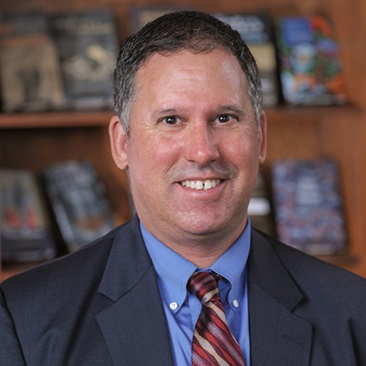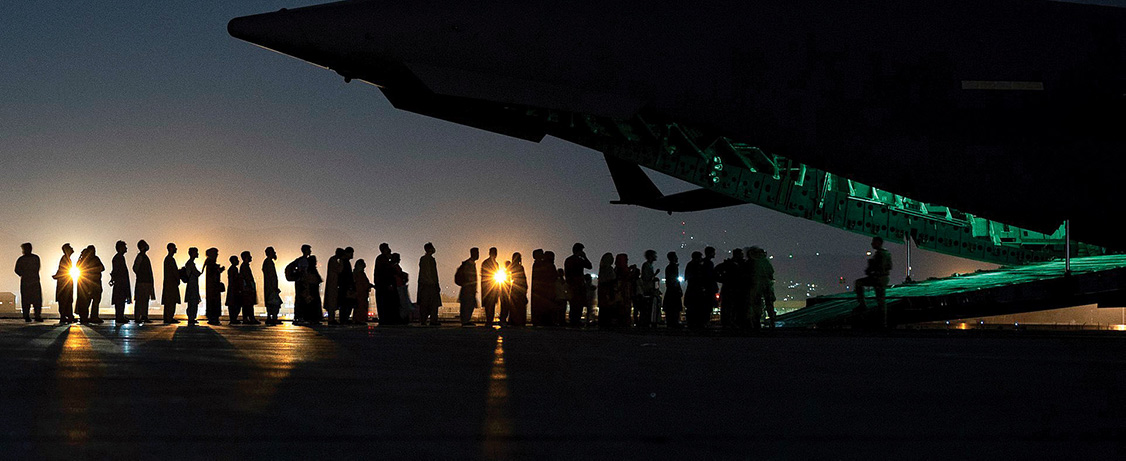
Anger, Despair and Seeds of Hope
December 17, 2021
Maxwell alumni wonder whether the changes they worked for in Afghanistan will endure after the ‘heartbreaking’ U.S. withdrawal.
Leaving dust in their wake, the young Afghan women set out for a miles-long run along a trail riddled with rocks and, every so often, a spent bullet.
The casings and an occasional rusted Soviet tank served as reminders of their country’s history of war. The women embodied its resilience.
Just a generation before, under the Taliban, they would have faced punishment, even death, for exercising in public. Women were forbidden to participate in sports or leave home without a male escort.
This fact was not lost on the women who ran together at dawn.
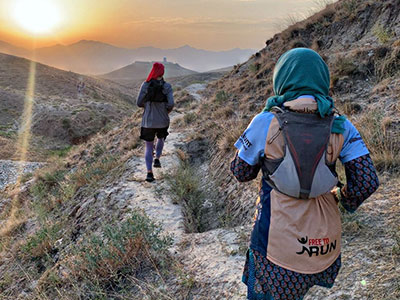
Nor was it lost on Adriana Curto. She is among alumni who have lived, worked or served in Afghanistan as soldiers, diplomats, humanitarians, attorneys and educators who share in anger and despair following the summer’s withdrawal of U.S. troops and subsequent Taliban coup.
From January to June 2021, Curto served as the Afghanistan country manager for Free to Run, a nonprofit that empowers Afghan women to participate in sports such as running to reclaim public spaces and to reconsider the roles they can—and should—have in society.
“These girls are experiencing so much trauma,” says Curto, who earned a degree in international relations and citizenship and civic engagement in 2016. “It is so unfair. I can’t help but think about what it must be like for them.”
Taliban leaders tried to assuage fears with claims they would rule with fewer restrictions. Yet, days after they claimed the capital, Kabul, The Ministry of Women’s Affairs—a building Curto drove past most every day—was turned into a headquarters for the Taliban’s ministry for the “propagation of virtue and prevention of vice.”
“If you served in Afghanistan, you return with a part of its soul in your blood. I feel a profound obligation to take care of these people because they are my brothers and sisters.”
Matt Zeller '06 M.P.A./M.A.I.R.
'Transforming Afghanistan'
Adriana Curto heard about Free to Run through a friend who had worked for the organization in Iraq. She developed an interest in sports as a pathway to empowerment while serving with the Peace Corps in Morocco.
During her two years of service, she helped develop programming for an outdoor youth leadership program. “It sounded incredible,” she says of the Free to Run opportunity. “I didn’t know much about Afghanistan, but I learned so much being there. It is an incredibly complex place.”
Most impressive were the young women. “In the news we never see the newer generation in Afghanistan—girls who are 15, 16, 17—who have grown up in this post- Taliban era and have worked to fight for a lot of different freedoms,” says Curto.
While times had changed since the Taliban fell in 2002, running was still not without risks for Free to Run participants. Yet, they persisted, waking up to board an unmarked van at 4:45 a.m. destined for a gated compound where they could safely run before school.
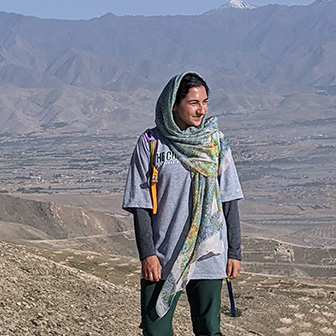
On weekends, they traveled further for long runs that took them past the spent bullets toward the mountains of the Hindu Kush. “It was really special and exciting for them to be able to do this,” says Curto.
Last spring, Curto sensed worry among the young women. They heard reports of the pending American troop withdrawal and murmurs at home about the potential for the Taliban’s return to power.
“They grew up hearing their parents talk about the days of the Taliban and a lack of women’s rights and education,” she says.
Two months after Curto returned home to New York, she watched news reports showing thousands of Afghans crowding the Kabul airport in hopes of evacuation. She learned that many of the women she knew made it out and are scattered across the globe as refugees. One of the former runners is a Fulbright scholar who arrived in the U.S. but told Curto she “can’t focus” on anything because she is consumed with worry for her family left behind.
“I can’t put into words how heartbreaking these past few months have been for our Afghan colleagues and friends,” says Curto.
Maxwell alumni Akbar Quraishi and Amy Friers know the heartache. From their home in Troy, New York, the husband and wife have kept tabs on their long list of relatives, friends and colleagues in Afghanistan.

Following the troop withdrawal, they heard pleas from those fearing they would be targets of the Taliban. Friers belongs to the Association of Wartime Allies and was asked by the organization to compile a list of those in need of evacuation.
She and Quraishi got to work, helping coordinate Afghans’ safe passage throughout the country and access to the airport. Thousands reached out for help. “We spent almost every minute of every day reaching out to try to find our people,” says Friers, who earned a bachelor’s degree in political science in 2011 and a master’s degree in international relations in 2017. “We barely slept, barely ate.”
Quraishi, an Afghan, joined the government following the Taliban’s collapse in 2002. Under constant threat, he worked in various high-level government positions before going to Maxwell for bachelor’s and master’s degrees in international relations, in 2009 and 2011, respectively.
He tutored his future wife, Friers, in Farsi. The couple moved to Kabul, and with the help of a few friends and Quraishi’s colleagues, opened the country’s first specialized international relations university.
Instructors encouraged critical thinking and recruited female students with scholarships. The university’s motto: “Transforming education, transforming Afghanistan.”
“There was a huge, huge push for education,” says Friers. “Everyone wanted a degree.”
After five years, Friers returned to the states with their three-month-old twins and resumed her studies at Maxwell as a graduate student. Quraishi later joined her and went to work as a diplomat at the Afghan Embassy in Washington, D.C. The couple continued to help oversee the university from afar. Friers also signed on with nonprofits like Team Afghan Power, an organization that brings electricity, internet and educational programming to rural schools. By early summer, a sense of urgency prevailed.
“Everyone was nervous,” says Friers. “Everyone thought something was going to go bad. We were trying to stay optimistic. When everything started falling to the Taliban, we thought, ‘It’s ok, there’s a plan. They are going to protect the capital.’ We were not prepared for how quickly Kabul fell to the Taliban.”
After several agonizing weeks, the couple got word that their university had survived, though it was open in a reduced capacity, without female students. Their efforts to help in the evacuation continued into the fall.
At times, their work felt futile, yet it was not in vain: They managed to get some out, including the first woman to enroll at the university.
Brothers and Sisters
Amid her work to help Afghans—including a nephew briefly captured by Taliban fighters—Amy Friers reached out to a fellow Maxwell graduate experienced in navigating the special immigration visa (SIV) process.
Army veteran and former CIA analyst Matt Zeller, who received master’s degrees in public administration and international relations in 2006, offered guidance during his own ’round-the-clock work to help Afghan allies. In a Washington, D.C., office suite, he spent the late summer directing a team of volunteers for an organization he co-founded with the Afghan interpreter who saved his life.
No One Left Behind advocates for the well-being and the safe placement of Afghan and Iraqi natives who worked as translators with U.S. troops. Using phones, laptops, flowcharts and diagrams, Zeller and volunteers kept track of those who were hiding in safe houses or trying to board evacuation planes.
On Aug. 15—the day Kabul fell to the Taliban—Zeller was keeping track of roughly 86,000 interpreters and family members seeking evacuation. A month later, he learned that 1,800 made it out. With the troops and U.S. diplomats departed, the evacuation effort continued through a largely underground network of humanitarians and organizations.
“We all just put our lives on hold,” says Zeller. He was joined by many other Afghanistan veterans in helping with the evacuation of Afghan allies while airing frustration with the White House’s handling of the withdrawal on major networks like CNN and MSNBC.
Years earlier, Zeller launched a media campaign to rally support to convince the U.S. Embassy in Kabul to grant a visa to the interpreter who saved his life on the battlefield 13 years ago, Janis Shinwari.

Shinwari fought off Zeller’s attackers just a few days after they were introduced, when Zeller began his tour as embedded combat advisor to the Afghan National Army and Police in Ghanzi Province. The act of heroism had an indelible impact on Zeller, who comes from a long line of military officers and enlisted after 9/11.
“I told him, ‘I don’t even know why you did it, man. Why did you save my life?” recalls Zeller. “He said, ‘You’re a guest in our country, I take a bullet before you.’”
For the remainder of Zeller’s tour, the pair forged a deep friendship over cups of chai and the constant threat to their lives. “If you served in Afghanistan, you return with a part of its soul in your blood,” says Zeller. “I feel a profound obligation to take care of these people because they are my brothers and sisters.”
Not the Same Afghanistan
Alumnus and former U.S. ambassador James Cunningham also bonded with Afghans and fellow diplomats amid constant threat of harm.
“You develop intense relationships with the people you are serving with. It makes the pain of what’s happening now in Afghanistan all the greater for us,” says Cunningham, who received a bachelor’s degree in political science and psychology from Maxwell and the College of Arts and Sciences in 1974.
He had a storied career at the Department of State, including serving as ambassador to Afghanistan from August 2012 to December 2014. Other posts included ambassador to Israel, consul general for Hong Kong and Macau and ambassador and deputy permanent representative to the United Nations in New York.
Two weeks after the 15th anniversary of 9/11, Cunningham visited the Maxwell School to give an Orange Central lecture titled “Afghanistan, Violent Islamic Extremism, and America.” He told the audience that America needs serious discussions that lead to a long-term, sustainable strategy in the region. He cited the education of young people and the recognition of women’s rights as critical to the country’s future. And, he acknowledged the growing sentiment among Americans questioning the continued commitment to Afghanistan.
“Fatigue over Afghanistan is more than understandable but is not the basis for good policy that protects our interests in a place where we have sacrificed much and have much at stake,” he said before making a foretelling plea, “Let us not lose sight of Afghanistan as we did after the Soviets left. Succumbing to fatigue will lead to failure of the better future Afghans are working for, deal a serious blow to the war on terror, and ultimately increase the danger to our own people as Afghan failure feeds the strength of the extremists.”
In the weeks following the withdrawal, Cunningham joined Matt Zeller in the public criticism of the withdrawal, with a particular concern for a potential terrorist resurgence. He has been frustrated, too, by the dismissal of what he says are important advancements in Afghanistan over the last 20 years. He points to increases in life expectancy and decreases in infant mortality; expanded educational opportunities, most notably for girls and women; the exchange of ideas via media outlets and access to cell phones and the internet; and strides toward democracy, with millions of men and women participating in elections, despite Taliban threats against them.
“With all its faults, with all the corruption and everything else, it is a country transformed,” says Cunningham. “That’s something the Taliban are finding out. It’s not the same Afghanistan and that’s going to be very difficult for them to deal with. It’s hard to be optimistic at this point but I will say the story is not over. Afghanistan has changed.”
'She Survives Again and Again'
After serving for 10 years as the executive director of Afghanistan’s Human Rights Commission, Maxwell School alumnus Mohammad “Musa” Mahmodi returned to the U.S. as a World Fellow at Yale’s Jackson Institute for Global Affairs. The appointment began in February 2020 and upon its completion, Mahmodi was invited to stay at Yale’s Schell Center for International Human Rights to continue his scholarly work.
Had it not been for that invitation, he would likely have gone back home to Afghanistan and, given the events of recent months, would likely have been a Taliban target.
“I have family and friends and colleagues in Afghanistan calling me and sending me messages asking for help,” he says. “I should not name them but there are a great number waiting for some opportunity to get out. They should not be condemned to live under some tyrant group.”

Mahmodi knows that painful reality. He was a sixth grader in Kabul when the Soviet rocket attacks began.
Going to school most days was too much of a risk, so he stayed home with his eight siblings and extended family. When the Soviets left, a civil war broke out. Kabul was left in ruins.
Then came the Taliban. Mahmodi’s father insisted they not join the thousands who fled. He “had a very deep love and connection to the country,” Mahmodi says. “We were the witnesses of every day’s violence in Kabul. It took very, very tragic forms.”
He saw friends killed in attacks. His fiancé was injured in an attack that claimed her brother’s life. He saw public hangings. Hunger became a way of life. Of all the horrors he witnessed, one that most resonates—or perhaps is easier to talk about— did not involve the loss of life.
Mahmodi remembers vividly how, one day, his mother obtained a small amount of flour—a prize for even those families like his who had financial means. She made a simple bread for her family and others sheltering with them.
“And then a militia came into our house and the first thing they found was the food and they ate it,” he recalls. “This kind of situation is traumatizing. We saw the despair on the face of every kid.”
Determined to bring change, Mahmodi attended Kabul University and obtained his law degree. He wanted to focus on human rights, yet there was little understanding of what that meant, even among those advocating for change. “That was the first challenge to overcome,” he says.
After working for two years to advocate for peace and human rights, Mahmodi was awarded a Fulbright scholarship for graduate studies at the Maxwell School. He came to Syracuse in 2007 to pursue master’s degrees in public administration and international relations.
“It was a unique opportunity, and I am thankful to Fulbright and to Maxwell to get the training,” he says. “Upon graduation I left Syracuse and went back to Kabul and started my new job as executive director of the Afghanistan Human Rights Commission.”
That post brought myriad obstacles. “Civilian casualties—all of those things were still happening,” he says. “Keeping the independence of the commission was another test. There was so much pressure, so many threats and intimidation.”
Mahmodi headed the commission for 10 years, defending the rights of even those facing criminal charges, which didn’t prove popular. He fought to protect freedom of speech and religion, to expand women’s rights, including their access to education. He oversaw 14 offices and some 600 staffers, operating “day and night, nonstop.”
“There was a huge array of human rights violations and violators,” he says. “It was a huge operation to hold them accountable. To be honest, it was exhausting.”
He stepped down in September 2019, just a few months before the opportunity arose at Yale. This past October, with his home country facing an uncertain fate, he wasn’t sure how his work to advance human rights would continue.
“I don’t know how successful I will be because everything I was hoping for is now gone,” he says. “I have always been an optimistic person; I always believed in better. We have made great achievements, providing a system in which women and minorities could live and work. There was a system of government, not perfect, but a civil society was there. But now, I really feel hopeless and helpless. It is such a tragedy.”
Still, a seed of hope remains. “I saw the downfall of Kabul but then she survives again and again,” says Mahmodi. “I hope to see it once more.”
By Jessica Youngman
RELATED STORY: For Doctoral Student, Afghanistan Is an Elusive Home
More from Matt Zeller
Army veteran and former CIA analyst Matt Zeller ’06 M.P.A./M.A.I.R. spoke in late July with fellow Maxwell alumnus John Boccacino ’20 E.M.P.A. for his podcast, ’Cuse Conversations. Zeller talked about his efforts to help Afghan allies seeking asylum and shared how Afghan interpreter Janis Shinwari saved his life on the battlefield. To listen to the episode, check out ’Cuse Conversations on Spotify, iTunes, Google Play and more. The podcast is offered by the University’s Office of Alumni Engagement.
Afghanistan Notebook
All told, dozens in the Maxwell community have served in Afghanistan over the last 20 years as soldiers, diplomats, humanitarians, educators and more.
Among them is Maxwell Assistant Dean for Washington Programs Mark Jacobson, who assisted in the evacuation effort and provided media commentary about the troop withdrawal. A reservist for over 25 years, he deployed to Afghanistan as a Navy intelligence officer in 2006 and returned three years later as the first Deputy NATO Senior Civilian Representative. During that time, Jacobson worked with Maxwell alumni Omar Qudrat ’10 J.D./M.A.I.R./M.S.P.R, a senior policy adviser at the NATO headquarters, and Hekmatullah Foushanji ’08 E.M.P.A./’09 M.A.I.R., an Afghan National Security Council staffer.
Additionally, John R. Bass ’86 B.A. (IR) served as the U.S. ambassador to Afghanistan from 2017-20. He returned to Kabul this past August to help manage the evacuation effort as the last U.S. troops withdrew.
Over the coming months, we’ll be gathering more stories of Maxwell connections to Afghanistan we hope to include in a new online Maxwell Perspective feature, “Afghanistan Notebook.” To share your story, send us an email at MaxwellPerspective@syr.edu with the subject line “Afghanistan.” Submissions should include details about your role in Afghanistan along with your current position, name, degree, class year and contact information.
Published in the Winter 2022 issue of the Maxwell Perspective
Related News
Commentary

Apr 2, 2025
Commentary
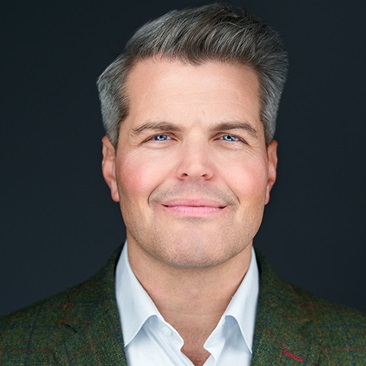
Apr 1, 2025
Commentary

Mar 31, 2025
